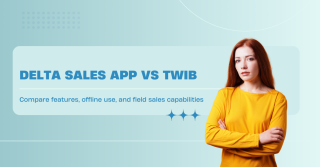Top Benefits of Using a Sales Force Tracker For Your Sales Team

In today’s fast-paced and highly competitive business environment, managing a sales team effectively is more critical than ever. Sales teams are the backbone of any organization, driving revenue and ensuring business growth. However, without the right tools and strategies, even the most talented sales teams can struggle to meet their targets. This is where a Sales Force Tracker comes into play. A Sales Force Tracker is a powerful tool designed to streamline sales processes, enhance productivity, and provide valuable insights into team performance.
In this blog, we’ll explore the top benefits of using a Sales Force Tracker for your sales team and how it can transform your business.
1. Improved Sales Team Productivity
One of the most significant advantages of using a Sales Force Tracker is the boost in productivity it provides. Sales teams often juggle multiple tasks, from prospecting and lead generation to closing deals and following up with clients. A Sales Force Tracker automates many of these processes, allowing your team to focus on what they do best—selling.
-
Task Automation: Repetitive tasks like data entry, follow-up reminders, and report generation can be automated, saving time and reducing errors.
-
Centralized Information: All customer data, sales pipelines, and communication history are stored in one place, eliminating the need to switch between multiple platforms.
-
Time Management: Sales reps can prioritize their tasks more effectively, ensuring they spend their time on high-value activities.
By streamlining workflows and reducing administrative burdens, a Sales Force Tracker enables your team to work smarter, not harder.
2. Enhanced Sales Pipeline Visibility
A clear view of your sales pipeline is essential for making informed decisions and forecasting revenue accurately. A Sales Force Tracker provides real-time insights into every stage of the sales process, from lead generation to deal closure.
-
Pipeline Tracking: Monitor the progress of deals and identify bottlenecks that may be slowing down the sales process.
-
Forecasting Accuracy: With access to up-to-date data, you can make more accurate sales forecasts and set realistic targets.
-
Lead Prioritization: Identify high-potential leads and focus your efforts on closing deals that matter most.
This level of visibility ensures that your sales team stays on track and that no opportunities slip through the cracks.
3. Better Customer Relationship Management
Building and maintaining strong relationships with customers is key to long-term success. A Sales Force Tracker helps your team manage customer interactions more effectively, ensuring that every touchpoint is meaningful and personalized.
-
Customer Insights: Access detailed customer profiles, including purchase history, preferences, and communication logs.
-
Timely Follow-Ups: Set reminders for follow-ups and ensure that no customer is left unattended.
-
Personalized Communication: Use customer data to tailor your messaging and offers, increasing the likelihood of conversion.
By fostering stronger relationships, your sales team can improve customer satisfaction and loyalty, leading to repeat business and referrals.
4. Data-Driven Decision Making
In the world of sales, data is king. A sales force tracker collects and analyzes vast amounts of data, providing actionable insights that can drive better decision-making.
-
Performance Metrics: Track key performance indicators (KPIs) such as conversion rates, average deal size, and sales cycle length.
-
Trend Analysis: Identify trends and patterns in customer behavior, enabling you to adjust your strategies accordingly.
-
Team Performance: Evaluate individual and team performance to recognize top performers and address areas for improvement.
With data at your fingertips, you can make informed decisions that optimize your sales processes and maximize results.
5. Improved Collaboration and Communication
Sales is often a team effort, and effective collaboration is essential for success. A Sales Force Tracker facilitates seamless communication and collaboration among team members, regardless of their location.
-
Shared Dashboards: Provide everyone with access to the same information, ensuring alignment and transparency.
-
Real-Time Updates: Keep the entire team informed about the status of deals, customer interactions, and upcoming tasks.
-
Feedback Loop: Enable team members to share feedback and best practices, fostering a culture of continuous improvement.
By breaking down silos and promoting collaboration, a Sales Force Tracker helps your team work together more efficiently.
6. Mobile Accessibility
In today’s mobile-first world, sales reps need access to critical information on the go. A Sales Force Tracker with mobile capabilities ensures that your team can stay productive no matter where they are.
-
On-the-Go Access: Update deals, check customer information, and communicate with team members from anywhere.
-
Offline Mode: Some trackers offer offline functionality, allowing reps to work even without an internet connection.
-
Push Notifications: Receive instant alerts about important updates, ensuring that nothing falls through the cracks.
Mobile accessibility empowers your sales team to be more agile and responsive, ultimately driving better results.
7. Cost Efficiency
Investing in a Sales Force Tracker may seem like an additional expense, but it can actually save your business money in the long run.
-
Reduced Administrative Costs: Automating repetitive tasks reduces the need for manual labor, lowering operational costs.
-
Higher ROI: By improving efficiency and closing more deals, your sales team can generate a higher return on investment.
-
Scalability: As your business grows, a Sales Force Tracker can scale with you, eliminating the need for costly upgrades or replacements.
The cost savings and increased revenue potential make a Sales Force Tracker a worthwhile investment for any business.
8. Enhanced Training and Onboarding
For new sales reps, getting up to speed quickly is crucial. A Sales Force Tracker can serve as a valuable training tool, helping new hires understand your sales processes and hit the ground running.
-
Standardized Processes: Provide new reps with a clear roadmap of your sales process, ensuring consistency across the team.
-
Performance Tracking: Monitor the progress of new hires and provide targeted coaching to address any gaps.
-
Knowledge Sharing: Encourage experienced reps to share their insights and best practices through the platform.
By accelerating the onboarding process, a Sales Force Tracker helps you build a more capable and confident sales team.
9. Competitive Advantage
In a crowded marketplace, staying ahead of the competition is essential. A Sales Force Tracker gives your business a competitive edge by enabling you to operate more efficiently and effectively.
-
Faster Response Times: Respond to customer inquiries and close deals more quickly than your competitors.
-
Better Customer Experience: Deliver personalized and timely interactions that set you apart from the competition.
-
Innovative Strategies: Use data-driven insights to develop innovative sales strategies that outpace your rivals.
By leveraging the power of a Sales Force Tracker, you can position your business as a leader in your industry.
10. Scalability and Flexibility
As your business grows, your sales processes need to evolve as well. A Sales Force Tracker offers the scalability and flexibility to adapt to changing needs.
-
Customizable Features: Tailor the platform to meet your specific requirements, whether you’re a small business or a large enterprise.
-
Integration Capabilities: Seamlessly integrate with other tools and systems, such as CRM software, marketing platforms, and analytics tools.
-
Future-Proofing: Stay ahead of industry trends and technological advancements with regular updates and new features.
With a Sales Force Tracker, you can future-proof your sales processes and ensure long-term success.
Conclusion
A Sales Force Tracker is more than just a tool—it’s a game-changer for your sales team. From improving productivity and visibility to enhancing customer relationships and driving data-driven decisions, the benefits are undeniable. By investing in a Sales Force Tracker, you can empower your sales team to achieve their full potential and take your business to new heights.
If you’re ready to transform your sales processes and unlock new opportunities, it’s time to explore the power of a Sales Force Tracker. Your sales team—and your bottom line—will thank you.
Frequently Asked Questions (FAQs)
1. What is a Sales Force Tracker?
A Sales Force Tracker is a software tool designed to help sales teams manage their workflows, track customer interactions, monitor sales pipelines, and analyze performance metrics. It streamlines sales processes and provides actionable insights to improve efficiency and productivity.
2. How does a Sales Force Tracker improve productivity?
By automating repetitive tasks, centralizing information, and providing tools for time management, a Sales Force Tracker allows sales reps to focus on high-value activities like closing deals and building customer relationships.
3. Can a Sales Force Tracker integrate with other tools?
Yes, most Salesforce Trackers are designed to integrate seamlessly with other business tools such as CRM systems, marketing platforms, and analytics software, creating a unified ecosystem for your sales operations.
4. Is a Sales Force Tracker suitable for small businesses?
Absolutely! Sales Force Trackers are scalable and customizable, making them ideal for businesses of all sizes. Small businesses can benefit from improved organization, better customer management, and enhanced sales performance.
5. How does a Sales Force Tracker help with customer relationships?
It provides detailed customer profiles, tracks communication history, and enables personalized interactions. This helps sales reps build stronger relationships and deliver a better customer experience.
6. What features should I look for in a Salesforce Tracker?
Key features to look for include pipeline tracking, task automation, mobile accessibility, performance analytics, and integration capabilities. Choose a tool that aligns with your business needs and goals.
7. Is training required to use a Sales Force Tracker?
Most Salesforce Trackers are user-friendly and intuitive, but some training may be required to fully leverage advanced features. Many providers offer onboarding support and resources to help your team get started.








